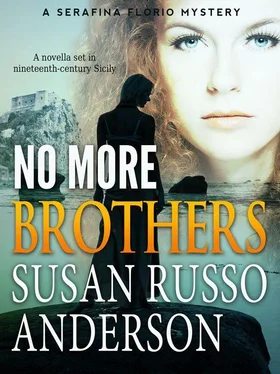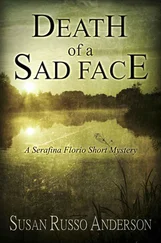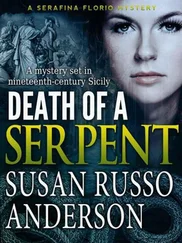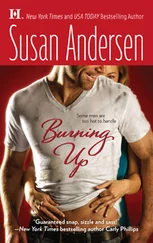Susan Anderson - No More Brothers
Здесь есть возможность читать онлайн «Susan Anderson - No More Brothers» весь текст электронной книги совершенно бесплатно (целиком полную версию без сокращений). В некоторых случаях можно слушать аудио, скачать через торрент в формате fb2 и присутствует краткое содержание. Год выпуска: 2012, Жанр: Исторический детектив, на английском языке. Описание произведения, (предисловие) а так же отзывы посетителей доступны на портале библиотеки ЛибКат.
- Название:No More Brothers
- Автор:
- Жанр:
- Год:2012
- ISBN:нет данных
- Рейтинг книги:3 / 5. Голосов: 1
-
Избранное:Добавить в избранное
- Отзывы:
-
Ваша оценка:
- 60
- 1
- 2
- 3
- 4
- 5
No More Brothers: краткое содержание, описание и аннотация
Предлагаем к чтению аннотацию, описание, краткое содержание или предисловие (зависит от того, что написал сам автор книги «No More Brothers»). Если вы не нашли необходимую информацию о книге — напишите в комментариях, мы постараемся отыскать её.
No More Brothers — читать онлайн бесплатно полную книгу (весь текст) целиком
Ниже представлен текст книги, разбитый по страницам. Система сохранения места последней прочитанной страницы, позволяет с удобством читать онлайн бесплатно книгу «No More Brothers», без необходимости каждый раз заново искать на чём Вы остановились. Поставьте закладку, и сможете в любой момент перейти на страницу, на которой закончили чтение.
Интервал:
Закладка:
“The name of the ship? The date of departure?”
She did not know.
As they waited for his secretary to retrieve the passenger lists, the admiral smiled at Rosa. “Like yesterday and yet so many years have passed. Not a day older, my sweet.”
Serafina looked at Badali and smiled.
It seemed like hours before the underling returned. “Rodolfo Pandolfina, a shoemaker from Oltramari in the province of Palermo, boarded a paddle steamer this afternoon. With him were his wife and two children. Earlier this week, he booked passage on a foreign vessel, the Aleppo . Tomorrow afternoon it leaves Messina bound for Liverpool.”
“Why Messina? Palermo’s not good enough for them?” Rosa asked.
The admiral shrugged. “Probably booked tickets for the first available passage.”
CHAPTER FORTY-TWO
Wednesday, February 20, 1867
Early the next morning, Rosa’s carriage rolled toward Messina’s harbor. The screeching of the gulls filled Serafina’s ears. Although they had stopped for the night at a comfortable inn on the outskirts, her eyelids felt like shells in rough sand.
As the coach swayed from side to side, so did Serafina’s mind. She wondered if, after all, Carlo had been correct and she was acting to make herself look good in the eyes of the public. Was the shoemaker an innocent man determined to escape the meanness of his present life and create a better world for his family? She shook her head, convinced of his guilt.
They stopped at a promontory overlooking Messina. The harbor was almost as large as the port of Palermo, Serafina thought, and this morning, it bustled. Vendors hawked their wares to crowds gathered around several docked vessels. Wagons carrying trunks moved in all directions. Passengers scurried off paddle steamers lugging their belongings. They called for porters or to family members or stood in long lines for boarding one of several moored ships. For a moment the scene made her breathless.
Badali stood next to her, rumbling on about the difference between a ship and a barque, but she paid no attention. Instead, she marveled at the movement of so many peoples, wondered where they were heading and why. She felt the salt sea air on her face and gazed through mist to the mainland. Listening to the slap of the waves, she pictured for an instant the ancient hag she’d seen last week in Oltramari’s piazza and remembered with amusement Teo’s account of her. The image faded and in its wake, Serafina felt the weight of farewells.
The policeman swung an arm toward the large vessel in front of them. “That’s the one we want, the Aleppo .” Its wharf teemed with carts and people. Men working pulleys hoisted large crates into the hold. On deck, the crew busied themselves checking the rigging, rolling barrels, or repairing sails.
Hoards of men and women pushed their way up a crowded plank. As they boarded, two men stopped them. “Checking credentials,” Badali said. Serafina visored her eyes looking for the shoemaker and his family.
“Look over there.” Badali indicated a group of carabinieri close to the stack who appeared to be talking to the ship’s officers. One flapped papers toward the gangplank.
“Let’s get down there,” Rosa said. “Can’t do anything from here. My guards will stay with the carriage.”
They walked for a few meters until Serafina saw an empty cart and asked the driver to take them down to the dock.
He shook his head. “Wharf restricted to passengers.”
Rosa intervened with coins and the cart’s wheels crunched gravel as they made their way down a steep road to the harbor.
“Boarding’s slow today,” one of the workers told them as they walked alongside the line of people waiting to board. “Shouldn’t be taking this long.” He wore a Phrygian cap and drooled in Rosa’s direction.
Without warning, the queue stalled. A moan went up from the line. Squinting up, Serafina saw carabinieri muscling their way down the steps, against the tide of oncoming passengers. Slowly they reached the bottom of the gangplank and clambered onto the wharf a few meters from where Serafina’s group stood.
With a shock, she saw them, the shoemaker and his family, surrounded by the military police. Badali and Serafina inched forward. She heard shouting and saw Graziella holding her baby and railing against her captors. Teo huddled against his father. Like a huge snake slithering away, the other passengers distanced themselves from the altercation.
“Terrible mistake,” Serafina heard Graziella say. Her voice sliced through the air like a bullet.
One of the carabinieri tried to placate her. “Orders are to hold your husband for questioning. Won’t take long and you can be on your way.”
“Take him , not us, you idiot!” Graziella rocked back and forth, flung her arms like a wild woman.
“But my dear lady,” the carabiniere began again.
She screamed it now, her arm pointing to her husband. “Take him!”
“Can’t. You’re on the same ticket, madam. ‘Rodolfo Pandolfina, party of four,’ it says.”
Graziella’s face mottled. “Don’t be pigheaded, man! Give me the ticket! Take him. He’s the one you want.” She grabbed for the ticket in the officer’s hand.
The shoemaker mopped his brow. “Be reasonable, my dear. Think of the children.”
“Damn you and your reason. That’s all I hear!”
Teo clung to his mother’s sleeve. “It’s all right, Mama. Please don’t shout. Not again, please!”
Graziella jerked herself free from her son’s grasp and spat her words. “Here, make yourself useful.” She thrust the baby into Teo’s arms.
Teo stood for a moment, facing away from his mother, looking out to sea. Slowly he rocked his brother.
Serafina ran to them, enveloped the boy and the baby, and backed away from the shouting to a safe distance. She hugged Teo and the baby to her side until they were buried in her voluminous skirts.
The whole world seemed to still, except for a woman gone mad. Graziella was screaming, her neck raw with congestion. People looked on, frozen.
So swiftly that Serafina thought her mind played its tricks again, Graziella reached into her reticule and withdrew a silver object. She aimed it at her husband and bellowed. He stood fast to the spot, opening and closing his mouth.
“Delayed until I could stand it no longer. Like glue, your mind. Finally! Finally I found someone to kill him. Almost succeeded. Would have, too, but for you.”
Graziella pulled the trigger.
Soft, the sound of the shot, it seemed no louder than a puff of wind.
Rodolfo fell, a blossom of red on his chest.
Graziella put the barrel to her temple.
Another puff of wind.
CHAPTER FORTY-THREE
They were silent as the coach rolled out of Messina. Rosa sat opposite Serafina who held the baby. Teo sat beside her, staring straight ahead.
Rosa told the driver to stop at the inn where they stayed last night. She asked for a wet nurse. They fed the horses and the baby and were off.
In a while, Teo lifted his face to Serafina. “Why?”
She looked at Rosa who said, “Tell him.”
Serafina did. Afterward, she said, “No one has the words to say how much your parents suffered. No one has the words to explain why your mother did what she did. No one has the words to take away your hurt.”
His tears began. Serafina was relieved. Handing the baby to Rosa, she wrapped her arms around the boy and held him so tight that she feared his bones would crack. She prayed to the Madonna . She did not interrupt his sobbing. She repeated her account of the event several times on the way home, holding him each time he wept.
Читать дальшеИнтервал:
Закладка:
Похожие книги на «No More Brothers»
Представляем Вашему вниманию похожие книги на «No More Brothers» списком для выбора. Мы отобрали схожую по названию и смыслу литературу в надежде предоставить читателям больше вариантов отыскать новые, интересные, ещё непрочитанные произведения.
Обсуждение, отзывы о книге «No More Brothers» и просто собственные мнения читателей. Оставьте ваши комментарии, напишите, что Вы думаете о произведении, его смысле или главных героях. Укажите что конкретно понравилось, а что нет, и почему Вы так считаете.












